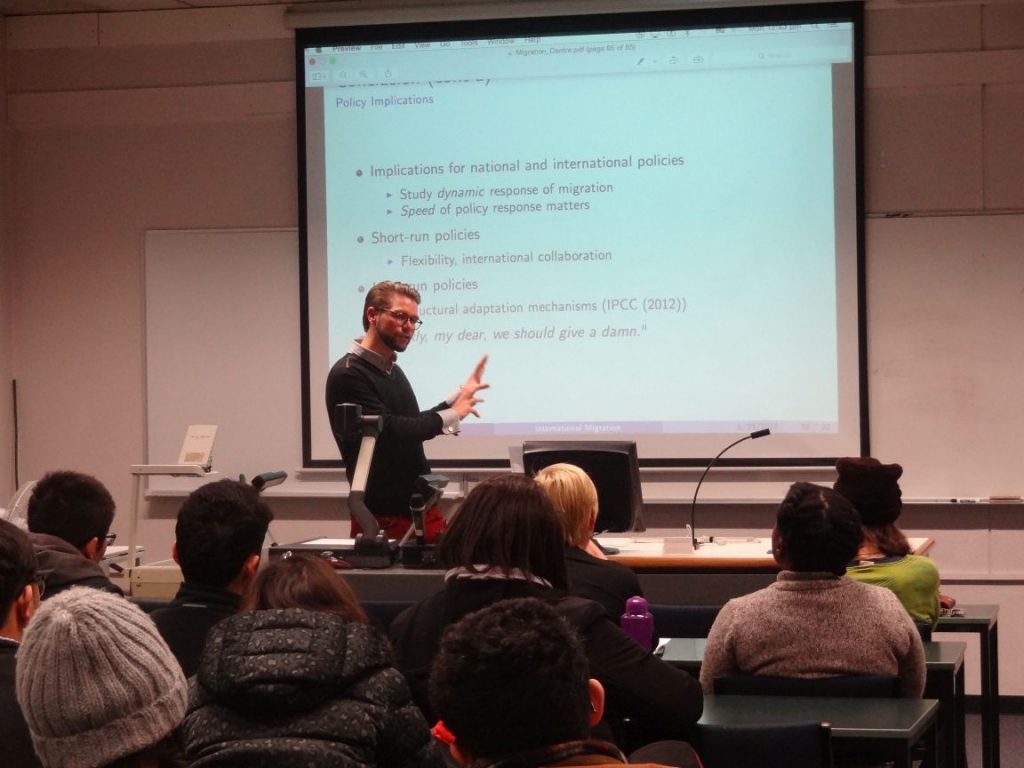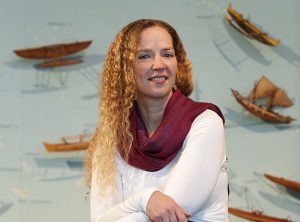Gone with the Wind: International Migration seminar
On 29 May 2017, Economics lecturer Dr Dennis Wesselbaum spoke about his recent research examining the drivers of international migration, with a particular focus on the climate. His presentation showcased findings from a rich dataset from 16 destinations (including New Zealand, Australia, the US, UK, Germany and France) and 198 countries of origin between the years 1980 and 2014.
What did the data reveal about the drivers of migration? While acknowledging the effect of factors such as wage differentials, migration cost, and political freedom, Dennis emphasised the importance of climate change, including rising temperatures and weather-related disasters such as heatwaves, droughts, and storms.
With an increase in temperatures since 1980, total weather disasters have tripled, with countries also experiencing more frequent disasters. Increased temperatures not only reduce crop yields but make water and resources scarce and could lead to increased civil unrest. In this context, migration can be understood as an adaptation strategy to climate change.
Further, the study shows that the response of migration over time is very different across varied driving forces. This has important policy implications so far neglected in the policy and public discourse.
A robust discussion followed Dennis’ presentation, including questions about his rational choice model when migration narratives often show ‘messy’ decision making, the importance of cultural networks for migrants, and why, despite a high temperature, so many move to Australia.
‘From Africa to Aotearoa’ seminar
‘From Africa to Aotearoa’ is one of Professor Lisa Matisoo-Smith’s current research projects and on 15 May 2017 the esteemed Professor of Biological Anthropology gave the inaugural Global Migrations seminar on this topic to a packed room.
Noting that her early work had examined the mitochondrial DNA (mtDNA) of rats, dogs and chickens to try to reconstruct Pacific migration pathways, Lisa’s current research on human mtDNA developed after 2008 when indigenous communities she was working with in New Guinea suggested examining their DNA. At the same time, National Geographic also approached Lisa to join their Genographic team studying human genetic diversity. In 2013, with the continued support of National Geographic and a Royal Society of New Zealand James Cook Fellowship, she began the Africa to Aotearoa study, involving random genetic sampling of more than 2,000 Kiwis at markets and some marae in main cities. Additional sampling focused on specific ethnic groups including New Zealand Chinese, Dalmatian and Lebanese communities.
Settled quite late towards the end of the thirteenth or early fourteenth century, New Zealand today has a diverse gene pool emanating from a common African matriarchal ancestor. Examining these DNA relationships highlights the diverse migration journeys of New Zealanders, from those first Maori colonists through to those arriving today.
Lisa’s overall results show that a large proportion of the New Zealand population has mtDNA that is very similar to the British Isles, especially in Dunedin, Christchurch and Wellington, with 40-50% of these populations having mtDNA Haplogroup H, followed by another 30% being made up of Haplogroups J, K, T and U. Auckland and Hamilton, by contrast, have larger Pacific, South Asian, and east Asia lineages with Otara’s sample exhibiting 54 per cent of Maori and Pacific mtDNA (Haplogroup B) genes. By contrast, Parnell’s population contains strong British genetic connections and Glenfield, South African.
Subsequent work from the project includes MBIE Curious Minds funding for teachers to undertake DNA testing and use their results to teach their classes about human evolution and human migration. In 2019, Lisa’s book from the Africa to Aotearoa project will be published, just in time to commemorate the 250th anniversary of Captain Cook’s landing in New Zealand.



